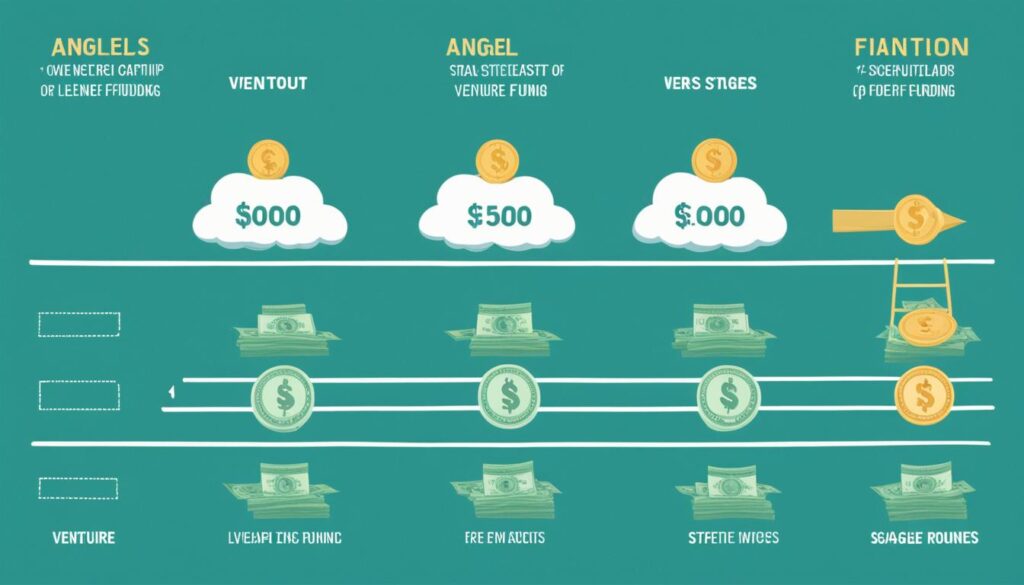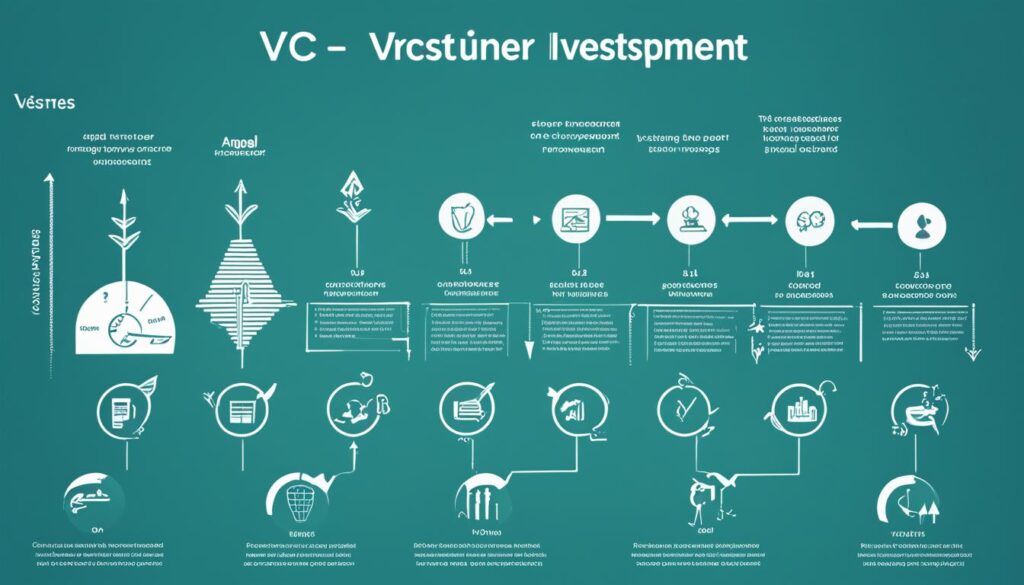If you’re starting a business and looking for funding, you’ve probably learned about angel investors and venture capitalists (VCs). Angel investors and VCs are both types of investors who help new companies grow. However, they have different ways of investing and the support they offer.
So, how do angel investors differ from VCs? This is a key question for anyone seeking investment. Angel investors and VCs have unique preferences, strategies, and involvement levels. Knowing how they vary can guide entrepreneurs in choosing the right investor for their business.
Key Takeaways
- Angel investors and venture capitalists have distinct investment approaches, funding stages, and the value they provide to startups.
- Angel investors typically invest smaller amounts in early-stage startups, while venture capitalists invest larger sums in later funding rounds.
- Angel investors often take a more hands-on, mentorship-driven approach, while venture capitalists tend to have a more structured, hands-on involvement.
- The equity stake and control dynamics differ between angel investors and venture capitalists, with the latter often demanding a larger equity share and board representation.
- Choosing the right investor type depends on the startup’s funding needs, growth stage, and the desired level of investor involvement and control.
Introduction: Understanding Startup Financing Options

Starting a business means needing money. Entrepreneurs use different ways to get funds for their ideas. This step is crucial. It helps businesses make products, hire people, and grow. Angel investors and venture capitalists are key for startups’ different growth stages.
The Importance of Funding for Entrepreneurial Ventures
Funding is vital for turning startup dreams into reality. It helps businesses create new things, find ways to survive, and aim for big goals. Without money, making products, finding good employees, and growing is hard for entrepreneurs.
Different Types of Investors and Their Roles
Angel investors and venture capitalists offer financial help at various startup stages. Knowing what each does is important. It helps startups find the right guidance and funding for their needs.
What is the difference between an angel investor and a venture capitalist?

Angel investors and venture capitalists invest in startups. But their ways of investing and what they offer are different. It’s important for entrepreneurs to know these key differences between angel investors and VCs. This helps them choose the best investor for their needs.
Angel investors are usually the first to invest. They offer money at the start, in the seed or Series A rounds. This is before the business is fully developed. Venture capitalists come in with more money in later stages, like Series B. They look for businesses that have shown growth.
Angel investors and VCs also differ in how they help businesses. Angel investors provide one-on-one guidance, using their own business experience. They help founders directly. Venture capitalists offer support through teams. This includes strategic advice and connections to help the startup grow.
Angel investors vs venture capitalists differ in how much of the business they own. Angel investors usually take a smaller piece, between 10-20%. This is for their early investment. Venture capitalists might want more, 20-40%, or even more. They might also join the board of directors to have a bigger say in business decisions.
The difference between angel investor and venture capitalist choices can impact the startup’s future. Figuring out the best fit for your business is important. Knowing these differences can guide founders in choosing wisely.
| Criteria | Angel Investors | Venture Capitalists |
|---|---|---|
| Funding Stages | Seed, Series A | Series B and beyond |
| Investment Amounts | $25,000 to $500,000 | $2 million to $10 million or more |
| Equity Stake | 10-20% | 20-40% or more |
| Involvement Level | Hands-on mentorship | Institutional, hands-on approach |
| Exit Strategies | Merger, acquisition, IPO; 5-10x return | IPO, strategic acquisition; 10-20x return |
Angel Investors: The Early-Stage Supporters

Angel investors are vital in helping startups at their earliest stages. They’re often people who have been successful in business. These angel investors provide money and advice to turn new ideas into successful companies.
Who Are Angel Investors?
Angel investors know a lot about starting businesses. They like to support new, exciting companies. Using their own money, they help start-ups grow, especially in their early days.
Advantages of Working with Angel Investors
Working with angel investors has many benefits. They give startups the money they need to start and grow. They also share their knowledge, experience, and connections.
Angel investors provide startups with more than money. They offer advice and guidance, helping entrepreneurs with their business strategies. This mentorship is very valuable in the early stages of a company.
Potential Drawbacks of Angel Investing
However, there are some downsides to consider. Angel funding is often limited, which might not be enough for a business’s long-term needs. These investors might also want to be very involved in running the company, which could affect the owner’s freedom.
There’s also a lot of risk with angel investors, as they support new and untested ideas. This might not suit all business owners, who could be looking for more certain funding options.
Venture Capitalists: The Professional Investors

Venture capitalists, or VCs, are investors who work with big funds and back high-growth startups. They come into play during later stages of funding, after the seed and Series A rounds. Their teams are made up of skilled evaluators. These experts pick startups they believe will go far.
What Are Venture Capital Firms?
Venture capital firms focus on giving cash and know-how to new, innovative companies. They are run by pros who understand many industries. They know how to pick winners in the investments they make.
The Venture Capital Investment Process
VCs do a very detailed check before they invest. They look at several things to see if a startup is likely to succeed. They focus on the market it’s in, how strong the startup’s leadership is, if it can grow quickly, and how it competes with others.
After investing, VCs don’t just sit back. They get involved. They offer not just money but also tips, contacts, and hands-on help. This aims to smoothen the path for startups, letting them deal better with growing fast and reaching their big dreams.
Investment Criteria and Focus Areas

Angel investors and venture capitalists (VCs) evaluate startup investment opportunities differently. It’s essential for entrepreneurs to know these differences. They should look for the right investor for their business.
Angel Investors’ Investment Criteria
Angel investors place a lot of importance on the founder’s passion and knowledge. They look at the chance for a good return on investment. They consider where the startup is right now and the vision the entrepreneur has. The uniqueness of the product, market opportunity, and the startup’s growth potential also matter to them.
Venture Capitalists’ Investment Criteria
Venture capitalists have a methodical approach to investing. They care about the size of the market, scalability, and fast growth. They want to see a startup with a proven model, a great team, and the chance to quickly get a big market share. The competitive edge, strong intellectual property, and how the startup plans to succeed are critical for VCs.
| Investment Criteria | Angel Investors | Venture Capitalists |
|---|---|---|
| Focus Areas |
|
|
| Investment Process |
More intuitive and personal, based on the founder’s characteristics and the startup’s current stage |
More systematic and data-driven, focusing on the startup’s growth potential and ability to capture a significant market share |
Funding Amounts and Stages

Angel investors and venture capitalists usually invest in different ways. Angels give smaller amounts early on, from $25,000 to $500,000. This helps startups grow at the beginning. It gives them money to make their products and start well.
Typical Investment Amounts for Angel Investors
Angel investors often give between $25,000 to $500,000. Most of their money, about $100,000 to $250,000, supports startups at the beginning. These funds help new businesses show their ideas work. They can then make their first products or reach big goals.
Venture Capital Funding Rounds and Amounts
Venture capitalists, on the other hand, invest larger amounts, like $2 million to $10 million. Sometimes, they invest even more. This happens later, during Series B or further rounds. They choose to put money in businesses that are already seeing success and can grow big. They’re looking for companies that can grow fast and become leaders in their market.
| Investor Type | Typical Investment Amounts | Funding Stages |
|---|---|---|
| Angel Investors | $25,000 to $500,000 | Seed, Series A |
| Venture Capitalists | $2 million to $10 million+ | Series B and beyond |
These different amounts and stages of funding show how angels and venture capitalists work. It’s important for entrepreneurs to know these details. They help pick the right investor for their business’s growth.
Equity Ownership and Control

Angel investors and venture capitalists have different ways of owning and controlling businesses.
Angel investors take around 10-20% of the business in the beginning. Because of this, they influence the business’s big moves a lot less. Founders get to keep more control over what happens.
Venture Capitalists’ Equity Stake and Board Representation
Venture capitalists, however, prefer a bigger piece, about 20-40% or more. They also insist on having a spot on the company’s board. This gives them more say in the company’s key decisions. Their actions show they want to be deeply involved and have significant control in the businesses they back.
| Equity Stake | Angel Investors | Venture Capitalists |
|---|---|---|
| Equity Stake | 10-20% | 20-40% or more |
| Board Representation | Less hands-on approach | Demand a seat on the board |
| Level of Control | Founders maintain greater control | Significant influence on strategic decisions |
Involvement and Value-Added Services

Angel investors and venture capitalists differ in how they support the startups they fund. Angel investors often provide hands-on mentorship, using their own journey to guide and help the startup founders. They check the details thoroughly, and those who spend 20 hours or more doing this are more successful in their investments.
Angel Investors’ Mentorship and Guidance
Angel investors focus on early-stage companies, often investing $25,000 to $100,000 of their money. Collectively, they might put over $750,000 into a business. Their advice and support are crucial for startups’ growth.
Venture Capitalists’ Hands-On Approach and Resources
Venture capitalists usually offer more hands-on help. They have teams that give operational help, strategic tips, and link startups to big networks. These investors pour about $7 million into each business. They also often spend more than $50,000 checking out investment chances. This deep involvement helps businesses blossom.
Exit Strategies and Return on Investment

Angel investors and venture capitalists have different exit strategies and expected returns. Angel investors look to gain 5-10 times their investment through a merger, acquisition, or IPO. Venture capitalists aim for a larger return, 10-20 times their investment. They achieve this through a successful IPO or a strategic acquisition.
Angel Investors’ Exit Strategies
Angel investors focus on early-stage investments and have a flexible approach to exiting. They aim to gain a 5-10 times return through various methods such as merger or acquisition. This approach supports the entrepreneurs they invest in, helping them grow.
Venture Capitalists’ Exit Strategies
Venture capitalists take a more systematic approach to their investments. They target a 10-20 times return, focusing on later-stage funding. Their exit strategies include a successful IPO or a strategic acquisition. This is due to their larger investment capacity and the process they follow.
| Metric | Angel Investors | Venture Capitalists |
|---|---|---|
| Typical Exit Strategy | Merger, acquisition, IPO | IPO, strategic acquisition |
| Target Return on Investment | 5-10x | 10-20x |
| Investment Approach | Flexible, hands-on mentorship | Structured, more rigorous |
| Funding Stages | Early-stage (seed, Series A) | Later-stage (Series B+) |
The differences in exit strategies and returns show the varied approaches of angel investors and venture capitalists. Entrepreneurs can use this understanding to choose the best investor for their startup. This choice can help them succeed by meeting their funding needs and growth goals.
Choosing the Right Investor for Your Startup
Entrepreneurs looking for funding must pick between an angel investor or a venture capitalist. They should think about how much money they need, the stage of their startup’s life, and the type of investor help they want. Every startup’s needs are different, so this choice is vital.
Evaluating Your Startup’s Needs and Growth Stage
Choosing an angel investor or a venture capitalist depends on where your startup is headed. Startups just beginning their journey or needing less money often turn to angel investors. They offer personal help and invest smaller amounts. But if you’re later on and need a big financial push, venture capitalists might be better.
Balancing Funding Requirements and Equity Dilution
Finding the right amount of funding without giving up too much ownership is key. The terms angel investors and venture capitalists offer can affect how much of your startup you still own. It’s essential to understand how funding impacts your control of the business. Balancing money needs with keeping as much of your startup as possible is a crucial decision.
It’s important for entrepreneurs to consider their startup’s specific needs and what kind of investor involvement they want. This way, they can wisely choose between an angel investor or a venture capitalist.
Conclusion
We looked into how angel investors and venture capitalists are different. As we’ve seen, they both play a major role in helping new businesses grow. Angel investors put in money early and offer a lot of advice. VCs invest more money later and help more with big-picture strategies.
It’s important for a business owner to know these differences. They need to choose the right kind of investor. This choice will depend on the business’s stage and what it needs to grow.
Entrepreneurs should think about what their business really needs. They should consider the level of help they want from an investor. This way, they can pick the investor that best fits their plans. Getting this right can make finding funding easier. It can also help their business grow the way they want.
